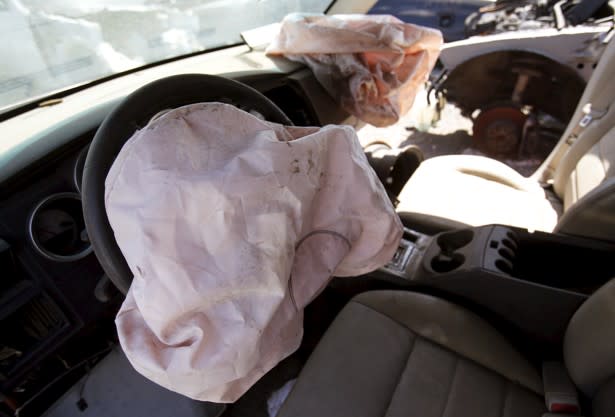Why the Massive Air-Bag Recall Won't Make Driving Much Safer

On Tuesday, the air-bag manufacturer Takata announced that it would be expanding a previous product recall to include some 34 million American cars, which is the largest automobile recall in history. Anthony Foxx, the Secretary of Transportation, responded with hyperbolic determination: “We will not stop our work until every air bag is replaced.”
If he and his colleagues stick to that rule, they will never retire.
It’s a victory for consumer welfare whenever a large company is held accountable for products that turn out to be harmful, but Takata’s recall of its potentially explosive air bags shouldn’t bring a lasting peace of mind, considering that one out of every seven U.S. cars has been recalled but not repaired. The reality is that no matter how far-reaching an automotive recall is—and this one is quite far-reaching, affecting 11 different manufacturers—millions of demonstrably unsafe cars will remain on the road. In fact, one of the most recently reported Takata-associated deaths was in a 2002 Honda Accord that was recalled in 2011 but never taken in.
Recommended: Why It Pays to Be a Jerk
This is the narrative arc of the American automotive recall: Isolated deaths are reported and faulty parts are suspected. Years later, a recall is issued, the media covers it, and an investigation uncovers a higher death count. Lawsuits trickle in. Eventually, the stories fade from the headlines, and many people keep on driving their recalled cars.
The tale of the Takata recall will likely be no different. Replacing even a portion of the affected air bags is complicated and will likely take years. Takata has said it can manufacture millions of replacement air bags a year, but makes no assurances about being able to make tens of millions. And in a twist reminiscent of the credits of Monty Python and the Holy Grail, the administrator of the National Highway Traffic Safety Administration acknowledged the possibility that eventually, the replacement air bags might themselves need to be replaced. On top of all that, air bags are embedded in a complicated system of sensors that is difficult and costly to work around in the repair shop. George Hoffer, an economist at the University of Richmond, suggested in some cases that it could be cheaper for companies to buy back a car instead of repairing its air bags.
Recommended: What Will Bobby Jindal's 'Marriage and Conscience Order' Actually Do?
The reality is that no matter how far-reaching an automotive recall is, millions of demonstrably unsafe cars will remain on the road.
And even if the repair processes somehow went off without a hitch, it’s not clear that the Takata recalls will bring in more drivers than the usual disappointing numbers. The more-severe drivers perceive a defect to be, says Hoffer, the more likely a recalled car is to be taken in. He thinks the possibility of explosive air bags and flying shrapnel might induce a higher rate of repair. On the other hand, Hoffer says, older cars and foreign cars are less likely to be brought in, and the affected cars are relatively old and mostly foreign. (Hoffer maintains, as he has for years, that manufacturers could increase repair rates by offering small perks, such as free oil changes.)
If auto manufacturers are occasionally making products that put lives at risk and consumers often don’t do anything to replace them, what can be changed? Not much, it appears—these are two unavoidable features of being a car-loving nation. Hoffer isn’t convinced that there would be fewer recalls if production were more closely scrutinized, because manufacturers and suppliers are being held liable for products that are expected to last longer and longer. “As these complicated technological wonders age,” he asks, “how will they perform?” A decade after being manufactured, many of these parts will naturally start to fail, and it’s hard to design them to be safer without wildly increasing costs.
Recommended: What If Everybody Didn't Have to Work to Get Paid?
Hoffer thinks recalls will only become more common as cars are made with more electronic components. “When things were mechanical, one had more warning and they were easier to fix,” he says.
So far, Takata’s air bags have been linked to six deaths. These preliminary estimates tend to grow over time; General Motors’s faulty ignition switches have been said to have caused more than 100 deaths, but at first that number was 13.
Those deaths are tragic, they’re awful, they’re avoidable, and they deserve to be less than statistics, but some context might change the way conventional coverage of recalls looks. The two biggest recalls of the past year (GM’s and Takata’s) have probably been responsible for a couple hundred deaths over the course of about a decade. But in the past year, more than 30,000 people have died in traffic accidents. That means that it’s likely that during the average two-week period, more people are dying in car crashes than have died from the past decade’s recall-related product failures. Two significant determinants of traffic fatality rates are highway-patrol funding and the sales tax on alcohol—not faulty car parts.
Traffic deaths occur with astounding regularity. Without a distinct event, a press release, or a widely-covered announcement to accompany them, transportation secretaries don’t have an opportunity to comment on them and newspapers can’t seem to find an occasion to report on them. As a result, the public can’t seem to be bothered by them.
This article was originally published at http://www.theatlantic.com/business/archive/2015/05/why-the-massive-takata-air-bag-recall-wont-make-driving-much-safer/393794/?UTM_SOURCE=yahoo
